- Home
- Carl Sagan
Contact Page 3
Contact Read online
Page 3
Sometimes she would be engaged in a laboratory exercise or a seminar when the instructor would say, “Gentlemen, let’s proceed,” and sensing Ellie’s frown would add, “Sorry, Miss Arroway, but I think of you as one of the boys.” The highest compliment they were capable of paying was that in their minds she was not overtly female.
She had to fight against developing too combative a personality or becoming altogether a misanthrope. She suddenly caught herself. “Misanthrope” is someone who dislikes everybody, not just men. And they certainly had a word for someone who hates women: “misogynist.” But the male lexicographers had somehow neglected to coin a word for the dislike of men. They were almost entirely men themselves, she thought, and had been unable to imagine a market for such a word.
More than many others, she had been encumbered with parental proscriptions. Her newfound freedoms—intellectual, social, sexual—were exhilarating. At a time when many of her contemporaries were moving toward shapeless clothing that minimized the distinctions between the sexes, she aspired to an elegance and simplicity in dress and makeup that strained her limited budget. There were more effective ways to make political statements, she thought. She cultivated a few close friends and made a number of casual enemies, who disliked her for her dress, for her political and religious views, or for the vigor with which she defended her opinions. Her competence and delight in science were taken as rebukes by many otherwise capable young women. But a few looked on her as what mathematicians call an existence theorem—a demonstration that a woman could, sure enough, excel in science—or even as a role model.
At the height of the sexual revolution, she experimented with gradually increasing enthusiasm, but found she was intimidating her would-be lovers. Her relationships tended to last a few months or less. The alternative seemed to be to disguise her interests and stifle her opinions, something she had resolutely refused to do in high school. The image of her mother, condemned to a resigned and placatory imprisonment, haunted Ellie. She began wondering about men unconnected with the academic and scientific life.
Some women, it seemed, were entirely without guile and bestowed their affections with hardly a moment’s conscious thought. Others set out to implement a campaign of military thoroughness, with branched contingency trees and fallback positions, all to “catch” a desirable man. The word “desirable” was the giveaway, she thought. The poor jerk wasn’t actually desired, only “desirable”—a plausible object of desire in the opinion of those others on whose account this whole sorry charade was performed. Most women, she thought, were somewhere in the middle, seeking to reconcile their passions with their perceived long-term advantage. Perhaps there were occasional communications between love and self-interest that escaped the notice of the conscious mind. But the whole idea of calculated entrapment made her shiver. In this matter, she decided, she was a devotee of the spontaneous. That was when she met Jesse.
• • •
Her date had taken her to a cellar bar off Kenmore Square. Jesse was singing rhythm and blues and playing lead guitar. The way he sang and the way he moved made clear what she had been missing. The next night she returned alone. She seated herself at the nearest table and locked eyes with him through both his sets. Two months later they were living together.
It was only when his booking took him to Hartford or Bangor that she got any work done at all. She would spend her days with the other students: boys with the final generation of slide rules hanging like trophies from their belts; boys with plastic pencil holders in their breast pockets; precise, stilted boys with nervous laughs; serious boys spending all their waking moments becoming scientists. Absorbed in training themselves to plumb the depths of nature, they were almost helpless in ordinary human affairs, where, for all their knowledge, they seemed pathetic and shallow. Perhaps the dedicated pursuit of science was so consuming, so competitive, that no time was left to become a well-rounded human being. Or perhaps their social disabilities had led them to fields where the want would not be noticed. Except for science itself, she did not find them good company.
At night there was Jesse, leaping and wailing, a kind of force of nature that had taken over her life. In the year they spent together, she could not recall a single night when he proposed they go to sleep. He knew nothing of physics or mathematics, buy he was wide awake inside the universe, and for a time so was she.
She dreamed or reconciling her two worlds. She had fantasies of musicians and physicists in harmonious social concert. But the evenings she organized were awkward and ended early.
One day he told her he wanted a baby. He would be serious, he’d settle down, he’d get a regular job. He might even consider marriage.
“A baby?” she asked him. “But I’d have to leave school. I have years more before I’m done. If I had a baby, I might never go back to school.”
“Yeah,” he said, “but we’d have a baby. You wouldn’t have school, but you’d have something else.”
“Jesse, I need school,” she told him.
He shrugged, and she could feel their lives together slip off his shoulders and away. It lasted another few months, but it all had really been settled in that brief exchange. They kissed each other goodbye and he went off to California. She never heard his voice again.
• • •
In the late 1960s, the Soviet Union succeeded in landing space vehicles on the surface of Venus. They were the first spacecraft of the human species to set down in working order on another planet. Over a decade earlier, American radio astronomers, confined to Earth, had discovered that Venus was an intense source of radio emission. The most popular explanation had been that the massive atmosphere of Venus trapped the heat through a planetary greenhouse effect. In this view, the surface of the planet was stifling hot, much too hot for crystal cities and wondering Venusians. Ellie longed for some other explanation, and tried unsuccessfully to imagine ways in which the radio emission could come from high above a clement Venus surface. Some astronomers at Harvard and MIT claimed that none of the alternatives to a broiling Venus could explain the radio data. The idea of so massive a greenhouse effect seemed to her unlikely and somehow distasteful, a planet that had let itself go. But when the Venera spacecraft landed and in effect stuck out a thermometer, the temperature measured was high enough to melt tin or lead. She imagined the crystal cities liquifying (although Venus wasn’t quite that hot), the surface awash in silicate tears. She was a romantic. She had known it for years.
But at the same time she had to admire how powerful radio astronomy was. The astronomers had sat home, pointed their radio telescopes at Venus, and measured the surface temperature just about as accurately as the Venera probes did thirteen years later. She had been fascinated with electricity and electronics as long as she could remember. But this was the first time she had been deeply impressed by radio astronomy. You stay safely on your own planet and point your telescope with its associated electronics. Information about other worlds then comes fluttering down through the feeds. She marveled at the notion.
Ellie began to visit the university’s modest radio telescope in nearby Harvard, Massachusetts, eventually getting an invitation to help with the observations and the data analysis. She was accepted as a paid summer assistant at the National Radio Astronomy Observatory in Green Bank, West Virginia, and upon arrival, gazed in some rapture at Grote Reber’s original radio telescope, constructed in his backyard in Wheaton, Illinois, in 1938, and now serving as a reminder of what a dedicated amateur can accomplish. Reber had been able to detect the radio emission from the center of the Galaxy when no one nearby happened to be starting up the car and the diathermy machine down the street was not in operation. The Galactic Center was much more powerful, but the diathermy machine was a lot closer.
The atmosphere of patient inquiry and the occasional rewards of modest discovery were agreeable to her. They were trying to measure how the number of distant extragalactic radio sources increased as they looked deeper into space. She began t
o think about better ways of detecting faint radio signals. In due course, she graduated cum laude from Harvard and went on for graduate work in radio astronomy at the other end of the country, at the California Institute of Technology.
• • •
For a year, she apprenticed herself to David Drumlin. He had a worldwide reputation for brilliance and for not suffering fools gladly, but was at heart one of those men you can find at the top of every profession who are in a state of unrelieved anxiety that someone, somewhere, might prove smarter than they. Drumlin taught Ellie some of the real heart of the subject, especially its theoretical underpinnings. Although he was inexplicably rumored to be attractive to women, Ellie found him frequently combative and unremittingly self-involved. She was too romantic, he would say. The universe is strictly ordered according to its own rules. The idea is to think as the universe does, not to foist our romantic predispositions (and girlish longings, he once said) on the universe. Everything not forbidden by the laws of nature, he assured her—quoting a colleague down the hall—is mandatory. But, he went on, almost everything is forbidden. She gazed at him as he lectured, trying to divine this odd combination of personality traits. She saw a man in excellent physical condition: prematurely gray hair, sardonic smile, half-moon reading glasses perched toward the end of his nose, bow tie, square jaw, and remnants of a Montana twang.
His idea of a good time was to invite the graduate students and junior faculty over for dinner (unlike her stepfather, who enjoyed a student entourage but considered having them to dinner an extravagance). Drumlin would exhibit an extreme intellectual territoriality, steering the conversation to topics in which he was the acknowledged expert and then swiftly dispatching contrary opinions. After dinner he would often subject them to a slide show of Dr. D. scuba diving in Cozumel or Tobago or the Great Barrier Reef. He was often smiling into the camera and waving, even in the underwater images. Sometimes there would be a submarine vista of his scientific colleague, Dr. Helga Bork. (Drumlin’s wife would always object to these particular slides, on the reasonable grounds that most of the audience had already seen them at previous dinner parties. In truth, the audience had already seen all the slides. Drumlin would respond by extolling the virtues of the athletic Dr. Bork, and his wife’s humiliation increased.) Many of the students gamely went along, seeking some novelty they had previously missed among the brain corals and the spiny sea urchins. A few would writhe in embarrassment or become absorbed in the avocado dip.
A stimulating afternoon for his graduate students would be for them to be invited over, it twos or threes, to drive him to the edge of a favorite cliff near Pacific Palisades. Casually attached to his hang glider, he would leap off the precipice toward the tranquil ocean a few hundred feet below. Their job was to drive down the coast road and retrieve him. He would swoop down upon them, beaming exultantly. Others were invited to join him, but few accepted. He had, and delighted in, the competitive advantage. It was quite a performance. Others looked on graduate students as resources for the future, as their intellectual torchbearers to the next generation. But Drumlin, she felt, had quite a different view. For him, graduate students were gunslingers. There was no telling which of them might at any moment challenge him for the reigning title of “Fastest Gun in the West.” They were to be kept in their places. He never made a pass at her, but sooner or later, she was certain, he was bound to try.
In her second year at Cal Tech, Peter Valerian returned to campus from his sabbatical year abroad. He was a gentle and unprepossessing man. No one, least of all he himself, considered him especially brilliant. Yet he had a steady record of significant accomplishment in radio astronomy because, he explained when pressed, he “kept at it.” There was one slightly disreputable aspect of his scientific career: He was fascinated by the possibility of extraterrestrial intelligence. Each faculty member, it seemed, was allowed one foible: Drumlin had hang gliding and Valerian had life on other worlds. Others had topless bars, or carnivorous plants, or something called transcendental meditation. Valerian had thought about extraterrestrial intelligence, abbreviated ETI, longer and harder—and in many cases more carefully—than anyone else. As she grew to know him better, it seemed that ETI provided a fascination, a romance, that was in dramatic contrast with the humdrum business of his personal life. This thinking about extraterrestrial intelligence was not work for him, but play. His imagination soared.
Ellie loved to listen to him. It was like entering Wonderland or the Emerald City. Actually, it was better, because at the end of all his ruminations there was the thought that maybe this could really be true, could really happen. Someday, she mused, there might in fact and not just in fantasy be a message received by one of the great radio telescopes. But in a way it was worse, because Valerian, like Drumlin on other subjects, repeatedly stressed that speculation must be confronted with sober physical reality. It was a kind of sieve that separated the rare useful speculation from torrents of nonsense. The extraterrestrials and their technology had to conform strictly to the laws of nature, a fact that severely crimped many a charming prospect. But what emerged from this sieve, and survived the most skeptical physical and astronomical analysis, might even be true. You couldn’t be sure, of course. There were bound to be possibilities that you had missed, that people cleverer than you would one day figure out.
Valerian would emphasize how we are trapped by our time and our culture and our biology, how limited we are, by definition, in imagining fundamentally different creatures or civilizations. And separately evolved on very different creatures or civilizations. And separately evolved on very different worlds, they would have to be very different from us. It was possible that beings much more advanced than we might have unimaginable technologies—this was, in fact, almost guaranteed—and new laws of physics. It was hopelessly narrow-minded, he would say as they walked past a succession of stucco arches as in a De Chirico painting, to imagine that all significant laws of physics had been discovered at the moment our generation began contemplating the problem. There would be a twenty-first-century physics and twenty-second-century physics, and even a Fourth-Millennium physics. We might be laughably far off in guessing how a very different technical civilization would communicate.
But then, he always reassured himself, the extraterrestrials would have to know how backward we were. If we were any more advanced, they would know about us already. Here we were, just beginning to stand up on our two feet, discovering fire last Wednesday, and only yesterday stumbling on Newtonian dynamics, Maxwell’s equations, radio telescopes, and hints of Superunification of the laws of physics. Valerian was sure they wouldn’t make it hard for us. They would try to make it easy, because if they wanted to communicate with dummies they would have to have a fighting chance if a message ever came. His lack of brilliance was in fact his strength. He knew, he was confident, what dummies knew.
As a topic for her doctoral thesis, Ellie chose, with the concurrence of the faculty, the development of an improvement in the sensitive receivers employed on radio telescopes. It made use of her talents in electronics, freed her from the mainly theoretical Drumlin, and permitted her to continue her discussions with Valerian—but without taking the professionally dangerous step of working with him on extraterrestrial intelligence. It was too speculative a subject for a doctoral dissertation. Her stepfather had taken to denouncing her various interests as unrealistically ambitious or occasionally as deadeningly trivial. When he heard of her thesis topic through the grapevine (by now, she was not talking to him at all), he dismissed it as pedestrian.
She was working on the ruby maser. A ruby is made mainly of alumina, which is almost perfectly transparent. The red color derives from a small chromium impurity distributed through the alumina crystal. When a strong magnetic field is impressed on the ruby, the chromium atoms increase their energy or, as physicists like to say, are raised to an excited state. She loved the image of all the little chromium atoms called to feverish activity in each amplifier, frenzied in
a good practical cause—amplifying a weak radio signal. The stronger the magnetic field, the more excited the chromium atoms became. Thus the maser could be tuned so that it was particularly sensitive to a selected radio frequency. She found a way to make rubies with lanthanide impurities in addition to the chromium atoms, so a maser could be tuned to a narrower frequency range and could detect a much weaker signal than previous masers. Her detector had to be immersed in liquid helium. She then installed her new instrument on one of Cal Tech’s radio telescopes in Owens Valley and detected, at entirely new frequencies, what astronomers call the three-degree black-body background radiation—the remnant in the radio spectrum of the immense explosion that began this universe, the Big Bang.
“Let’s see if I’ve got this right,” she would say to herself. “I’ve taken an inert gas that’s in the air, made it into a liquid, put some impurities into a ruby, attached a magnet, and detected the fires of creation.”
She would then shake her head in amazement. To anyone ignorant of the underlying physics, it might seem the most arrogant and pretentious necromancy. How would you explain this to the best scientists of thousand years ago, who knew about air and rubies and lodestones, but not about liquid helium, stimulated emission, and superconducting flux pumps? In fact, she reminded herself, they did not have even the foggiest notion about the radio spectrum. Or even the idea of a spectrum—except vaguely, from contemplating the rainbow. They did not know that light was waves. How could we hope to understand the science of a civilization a thousand years ahead of us?

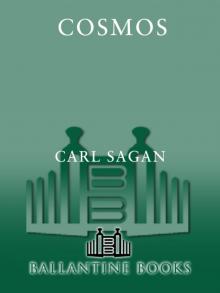 Cosmos
Cosmos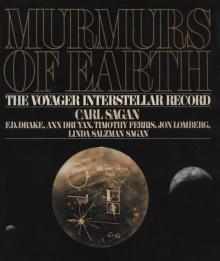 Murmurs of Earth
Murmurs of Earth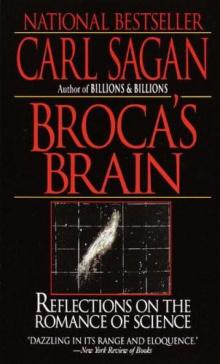 Broca's Brain
Broca's Brain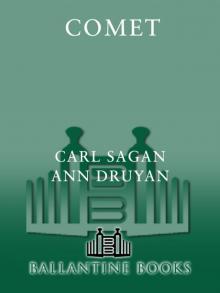 Comet
Comet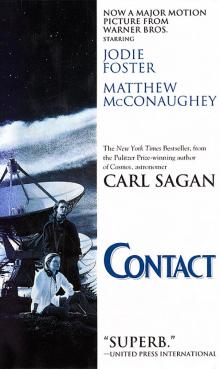 Contact
Contact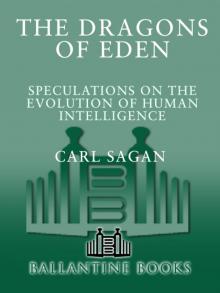 Dragons of Eden
Dragons of Eden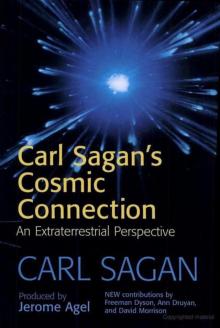 Cosmic Connection
Cosmic Connection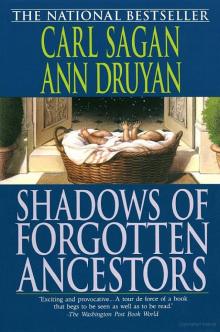 Shadows of Forgotten Ancestors
Shadows of Forgotten Ancestors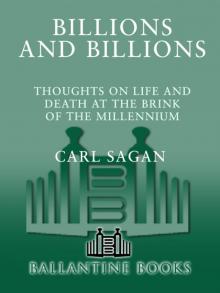 Billions & Billions
Billions & Billions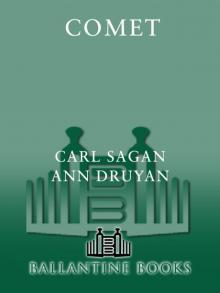 Comet, Revised
Comet, Revised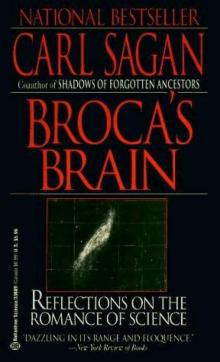 Broca's Brain: The Romance of Science
Broca's Brain: The Romance of Science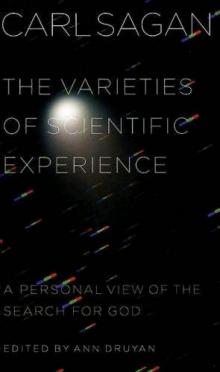 The Varieties of Scientific Experience: A Personal View of the Search for God
The Varieties of Scientific Experience: A Personal View of the Search for God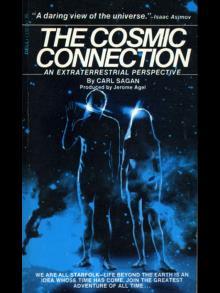 The Cosmic Connection
The Cosmic Connection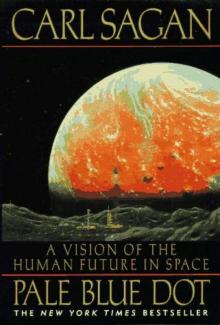 Pale Blue Dot: A Vision of the Human Future in Space
Pale Blue Dot: A Vision of the Human Future in Space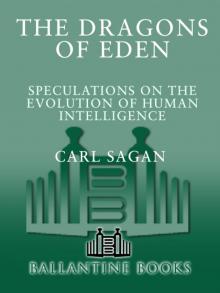 The Dragons of Eden
The Dragons of Eden